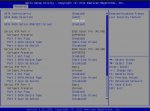Hi all,
Recently (now seemingly foolishly) I updated the BIOS on my X10SL7-F (from 2.2 - 3.0), I immediately noticed some of my VM's were not starting and data stores were missing. FreeNAS was OK.
I tracked this down to one of the SSD's not being found in BIOS, one was on port 0 and the other on port 1. Port 0 was showing empty in BIOS but port 1 was OK. Hooking both SSD's to the SATA 2.0 ports was OK.
After contacting Supermicro, we went through different tests which included another BIOS update, an IPMI update and swapping a non SSD drive to port 0 (this worked). Through these tests, port 1 started to act randomly and sometime shows up, sometimes not with every restart.
Supermicro eventually concluded there was a hardware fault, and would have to RMA the motherboard. Before I go through the hassle of doing so, I wondered if any one else has experienced this? bearing in mind all was well prior to the BIOS update. My workaround for the meantime is to use ports 4 & 5.
Recently (now seemingly foolishly) I updated the BIOS on my X10SL7-F (from 2.2 - 3.0), I immediately noticed some of my VM's were not starting and data stores were missing. FreeNAS was OK.
I tracked this down to one of the SSD's not being found in BIOS, one was on port 0 and the other on port 1. Port 0 was showing empty in BIOS but port 1 was OK. Hooking both SSD's to the SATA 2.0 ports was OK.
After contacting Supermicro, we went through different tests which included another BIOS update, an IPMI update and swapping a non SSD drive to port 0 (this worked). Through these tests, port 1 started to act randomly and sometime shows up, sometimes not with every restart.
Supermicro eventually concluded there was a hardware fault, and would have to RMA the motherboard. Before I go through the hassle of doing so, I wondered if any one else has experienced this? bearing in mind all was well prior to the BIOS update. My workaround for the meantime is to use ports 4 & 5.

